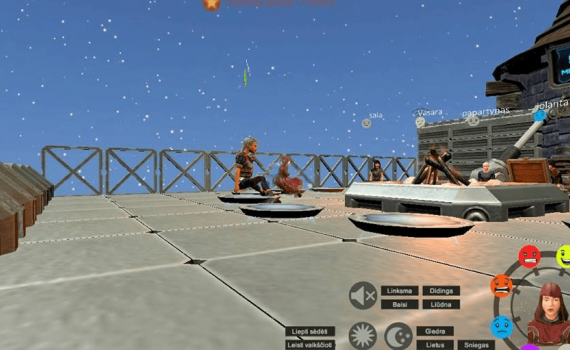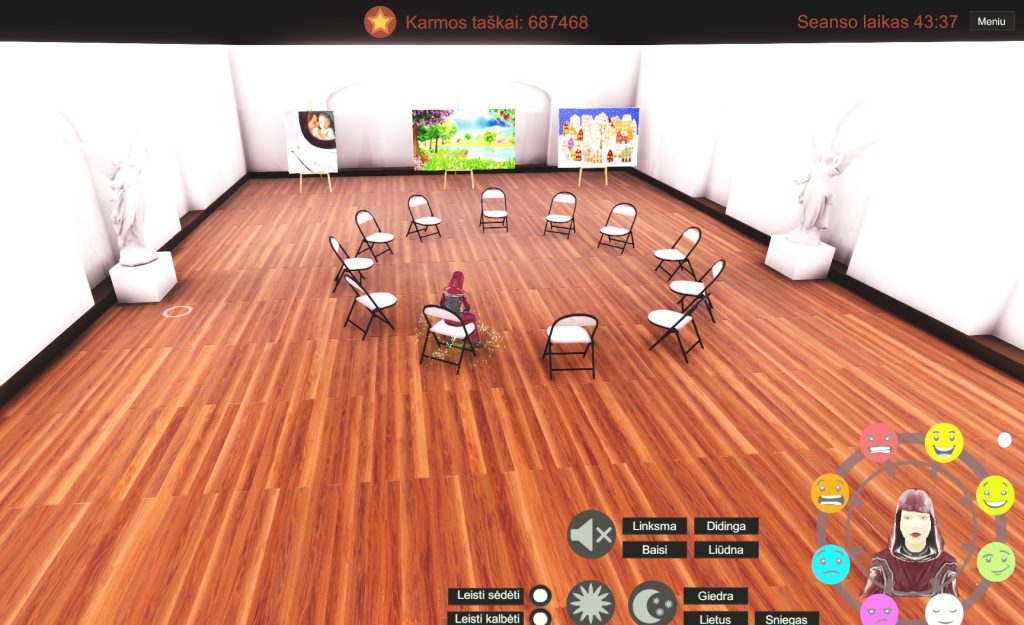
Naujoji Vilnia Library in Lithuania invites children who are going through emotional difficulties, and their families, to join therapeutic reading and storytelling activities in a virtual gaming environment. The activities, in the library’s ‘Isl@nd of Openness’ programme, are designed to help the participants to cope with these difficulties, and to encourage them to open up and speak to specialists who can provide further support.
A branch of the Central Library of Vilnius City Municipality, Naujoji Vilnia Library provides sociocultural services for a multicultural community, including immigrants who suffer from social exclusion and Ukrainian families who relocated to Lithuania when Russia invaded their country.
The ‘Isl@nd of Openness’ is a technology-based group therapy process that integrates bibliotherapy into a virtual environment. It is guided by a psychologist-educator and bibliotherapy practitioner who selects therapeutic texts in different genres (fiction, non-fiction, poetry).
The psychologist-educator, the children and teenagers, and sometimes family members or carers, register with an administrator and create avatars for attending online reading therapy sessions. The psychologist-educator reads texts focused on problematic situations or challenges, and the participants, represented by their avatars, discuss their feelings and possible solutions to problems that they are facing. The children feel safe using their avatars, because they are anonymous and will not be exposed. As they become more confident, they open up and reveal more about their situations and feelings.
There are three main virtual spaces used for the bibliotherapy meetings: a chatroom with a classic interior; an outdoor space with nature, and an observation tower space. In addition to participating in chat sessions using these spaces, participants can create their own personal spaces, or communicate with each other through text messages.
How the programme is helping the children
The programme is offered annually. When new families register, the library conducts surveys and focus groups to find out what kinds of problems they are experiencing. Many issues are raised - physical, sexual and verbal violence, bullying, alcohol and drug abuse, expectations that are too high, lack of self esteem, and inappropriate behaviour of relatives, other children or friends.
During the programme there is observation of the participants, and at the end of the programme there are further surveys to assess the children’s progress.
In 2021 analysis of data found that the psychological discomfort of about 60% of the children reduced during the first five ‘Isl@nd of Openness’ sessions - the children understood the sessions, and were forming more positive attitudes to themselves, their friends and their families.
From 60% to 80% of the children indicated that the sessions helped them to communicate with others and that bibliotherapy was helping to solve their emotional, behavioural and relationship problems. Most of the children wanted to continue in the ‘Isl@nd of Openness’ programme.
Observations found that reading and talking about the bibliotherapy texts had a positive effect on metacognitive awareness and critical thinking. The opportunity for children to imagine their own virtual worlds encouraged creativity. The virtual games, in which participants raise pets, make friends with neighbours, wash dishes and do other tasks in the home, led to a more serious and responsible approach to family life.
What the children said - 
“I became braver.”
“I'm not in a hurry, I'm listening.”
“I don't know exactly, but I liked it.”
“It was interesting to talk with the psychologist and other participants.”
“I really enjoyed talking openly.”
“I know more about adults.”
“...I am like everyone else.”
“I received advice from the participants.”
What the parents said -
“The gaming environment is very good, it's fun to create your own virtual world after the (bibliotherapy) conversations.”
“In the form of a game, we could leave our body with current problems, household, emotions and concentrate on our inner world, look at everything as if from above, thus absorbing information and knowledge perfectly.”
“Thank you, especially for my daughter, who for the first time got the opportunity to talk to a professional adult, to open up, to be safe, the avatar made us very happy.”
The programme is the first of its kind in Lithuania. In 2020 The Department of Regional Development under the Ministry of the Interior recognized the ‘Isl@nd of Openness’ as the best initiative reducing psychosocial problems in the Vilnius region. And it is increasingly in demand, with expansion through the Central Library of Vilnius City Municipality network and partner institutions in the cultural, educational and social sectors in Vilnius.
More Innovative public library services supporting children's education.
PLIP-HEALTH





